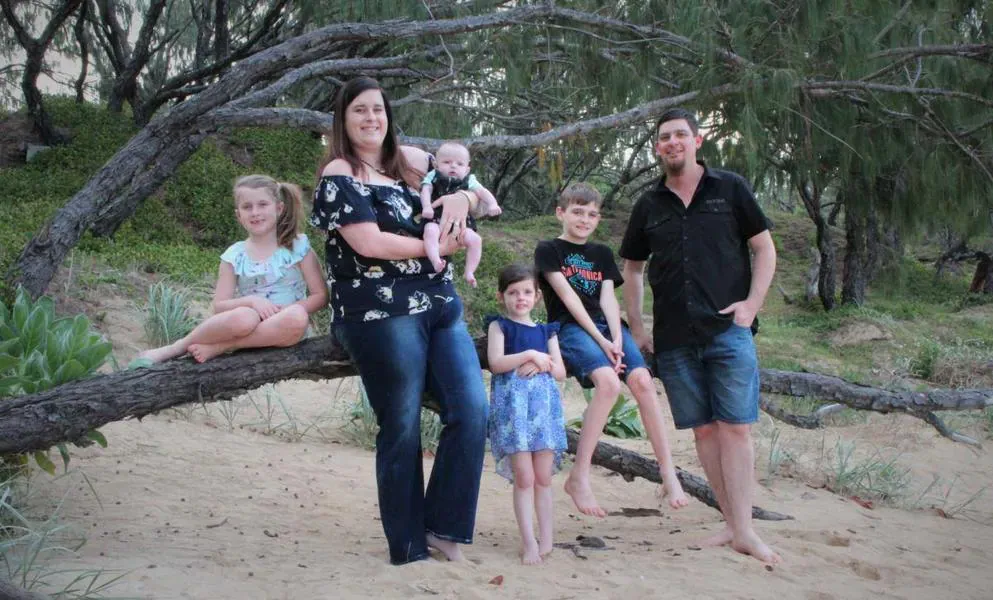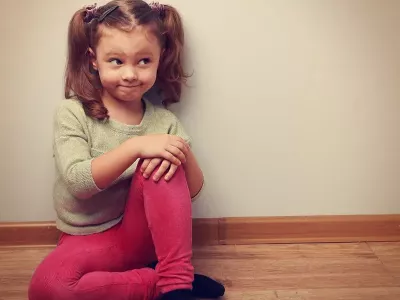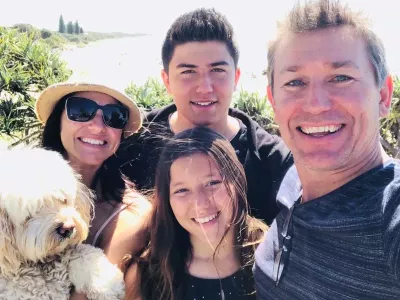Family now packs resilience into their emergency kit

Queensland parents Stephanie and Karl Black are now able to pack emotional resilience into their family emergency kit along with things like torches and fresh water, thanks to the Triple P – Positive Parenting Program.
The family lost almost everything they owned under 1.2 metres of water when post-Cyclone Debbie flooding forced them to walk to safety, carrying their children on their shoulders, from their home at Draper’s Siding, near Eton (south-west of Mackay), in March last year.
Furniture, fittings, appliances, clothes, their car; everything was gone, and like many families, they were under-insured.
“Our life has changed dramatically since Cyclone Debbie," says Stephanie.
The family have had to move four times, and their three school-aged children (aged 5, 7, and 10) have had to change schools and preschools. Stephanie says the financial and emotional costs have been very high, but going along to a Triple P Raising Resilient Children seminar in Mackay earlier this year has really helped.
“I needed to know how to parent in this situation,” Stephanie says.
“I was in a rut, miserable and questioning why everything had happened to us and it was rubbing off on my children, especially my oldest son who started experiencing anxiety and thinking things were somehow his fault after the cyclone.”
Later in the year, the family were also dealt another blow with the loss of Stephanie’s job: she’d had to return to full-time after Cyclone Debbie to help support the family, but then was made redundant. She says the coping skills she learnt at the Triple P seminar also helped her through that transition.
“I was able to process the redundancy more positively, and I know that if I didn’t have the skills I learnt about resilience I would probably once again be questioning why that had happened to me and feeling miserable,” says Stephanie.
The emotional resilience to cope with life’s ups and downs is a key skill we can pass on to our children, explains Professor Matt Sanders from the Triple P – Positive Parenting Program. He says how a parent responds to stressful life events such as a natural disaster has a powerful impact on children.
“Children look to the adults in their life for cues on how to respond to difficult situations, so the better a parent can cope with challenges, the better role model they can be to their children,” he says.
“The good news is resilience is a life skill that can be taught, and can be learnt. That’s why Triple P has been on the road for the past 12 months delivering free Raising Resilient Children seminars to parents still dealing with the impact of Tropical Cyclone Debbie.”
SEMINARS STILL BEING RUN
So far, almost 900 parents have attended seminars in the Mackay, Whitsunday and Isaac region and in parts of Logan and the Gold Coast to learn how to encourage their children to manage emotions, deal with stress, cope with disappointment, problem-solve and maintain a positive attitude in the face of challenging circumstances.
Fifty seminars will be delivered by late March next year, jointly funded under the Commonwealth-State Natural Disaster Relief and Recovery Arrangements (NDRRA).
Professor Sanders says the psychological impact on a child from seeing their home and possessions under threat, damaged or destroyed, and their parents in distress, can be much more than people realise.
“It’s not uncommon for children in this situation to develop behaviour problems or for existing problems to worsen,” he says. “This could be anything from disrupted eating and sleeping patterns including nightmares and bedwetting, through to feeling more anxious, hypervigilant, fearful and generally overwhelmed.”
He adds that prevention is always better than a cure when it comes to managing children’s behaviour.
“It’s much more effective for parents to get in early to prevent minor behavioural issues from becoming major problems,” he says.
SUNNY DAYS AHEAD
And there’s a happy ending for the Black family.
“It’s actually been a blessing in disguise for us, I’m home full-time with the children now and things are looking up – there’s a light at the end of the tunnel for all of us,” says Stephanie.
The Blacks have been settled into a home for over a year, have a new 7-month-old baby, and the kids have found their feet at their new school.
“My son is doing better with managing his anxiety and we are getting the help for him that he needs,” Stephanie says. “I know I wouldn’t be in this position mentally if I didn’t attend the resilience seminar.”
“While Cyclone Debbie was life-changing, learning these skills has also been life-changing in a positive way for our entire family.”
See what Raising Resilient Children seminars are available in your area by checking our calendar.
Or you can do a Triple P program in your own home, with Triple P Online, or Teen Triple P Online.

